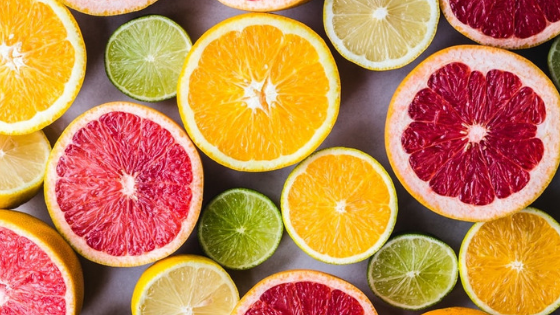
Vitamin C for Youthful Skin
Share
Most of us think of Vitamin C as a cold and flu preventative. But what if I told you that having optimal amounts of dietary Vitamin C is crucial to maintaining healthy and youthful skin? It’s true! Vitamin C doesn’t just bolster immunity, it also makes us beautiful!
An important role of vitamin C is its action as a cofactor in the formation and maintenance of collagen. Collagen is the structural protein that forms the connective tissues of the body, including the skin. Think of collagen as coils of protein that provides structure and support for the skin. As we age, our collagen production slows down. This, in turn, causes the skin to lose its fullness and begin to sag and wrinkle. For these reasons it is important that we maintain and even increase our intake of vitamin C rich foods as we age.
Due to its immuno-supportive properties Vitamin C also improves wound healing. This is especially important for those who suffer from acne or have experienced any kind of skin trauma, including sunburn. Vitamin C helps the skin heal and regenerate from the inside out.
Due to its antioxidant properties, Vitamin C also fights free radical damage that contribute to the aging process. Free radicals also injure cellular DNA. This damage may result in impaired cellular function and even cellular death. Vitamin C acts as an antioxidant bodyguard to protect the skin from dangerous free radicals.
Finally, Vitamin C also improves the body’s ability to absorb iron in our foods. Iron requires an acidic environment to be broken down and absorbed. Low iron levels may result in dull and lifeless looking skin. When iron levels are within a healthy range skin will have a lustrous glow. Vitamin C enhances the body’s ability to absorb the iron from the foods that we eat.
Vitamin C is considered an essential nutrient because it must be obtained from the diet. This water soluble vitamin is sensitive to heat and is therefore highest in fresh raw or lightly steamed vegetables and fruits. Most people aim to obtain their dietary Vitamin C from citrus fruits and vegetables. While these remain an excellent source there are so many other foods that are rich in this important vitamin. These include but are not limited to bell peppers, dark leafy greens such as Swiss chard, spinach and kale, broccoli, tomatoes, kiwi, papaya and berries.
In some instances, health care practitioners may also recommend Vitamin C supplementation. Please check with your health care provider before beginning any new supplementation.

Improving Vitamin C levels is just one of the ways we can support the overall health of our bodies largest organ, the skin. If you are looking for a more individualized healthy skin protocol including dietary, supplement and lifestyle recommendations, consider scheduling in for a nutrition consultation. Appointments are available in person, over the phone or via Skype.
Have a healthy day!
Written by Julia Davie, NutriChem Registered Holistic Nutritionist and Doula
Julia is a graduate of the Canadian School of Natural Nutrition. Julia’s services emphasize the importance of whole, live and natural foods. Striving to make healthy eating accessible and enjoyable, she believes that food can be both nutritious and delicious! As a Registered Holistic Nutritionist, she understands the unique needs of each client and works with them to develop and implement a healthy eating plan individualized to their needs.
Julia strives to empower her clients through education, inspire them to make better food choices, and live healthier and more vibrant lives.
Julia’s special interests include digestive support, weight loss, skin health, blood sugar support, fertility nutrition, prenatal, postnatal and pediatric nutrition.
Click here for Julia's recipes.
Call: 613-820-4200 to book an appointment with Julia.
Email: jdavie@nutrichem.com




